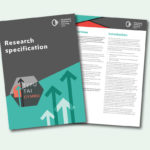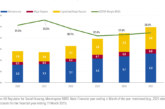The latest report by housing policy research project — Tyfu Tai Cymru (TTC) — claims ongoing housing shortages could be alleviated by addressing the stigma associated with social housing and increasing community engagement.
The research project, funded by the Oak Foundation and managed by the Chartered Institute of Housing (CIH) Cymru, aims to provide insightful analysis to examine barriers and support Welsh housing policy progression. Published on 7th March, the latest paper investigates the issues in the development system that are hindering housing supply.
Key findings show:
- The shortage of social housing and growing demand severely limits opportunities for choice, creating a conflict between a hard, minimal assessment of need and creating desirable and sustainable homes.
- Consultation, although built into local development plan adoption processes and individual planning applications, is limited as it relies on individuals being proactive in expressing their views.
- Stigma associated with social housing is often expressed through the planning process.
The report makes several recommendations for Welsh Government and the wider housing sector on how to involve communities in housing development planning and calculating local housing need including:
- Housing enablers play an important role in rural areas, providing an independent point of contact between the community and developing landlord.
- Communities need to be involved in the calculations of housing need to ensure the right homes are built in the right place.
- Reduce and eradicate stigma around existing and proposed new social housing developments.
- Make community engagement a mandatory part of the social housing grant process.
 Commenting on the significance of the report’s findings Cerys Clark, Policy and Public Affairs Manager at CIH Cymru, said: “No one can deny that Wales is in the midst of a housing crisis with a significant shortage of social and affordable homes. Yet new developments are regularly met with opposition stemming from stigma often associated with social housing.
Commenting on the significance of the report’s findings Cerys Clark, Policy and Public Affairs Manager at CIH Cymru, said: “No one can deny that Wales is in the midst of a housing crisis with a significant shortage of social and affordable homes. Yet new developments are regularly met with opposition stemming from stigma often associated with social housing.
“This report shows us is that if we want to increase development and reduce social housing stigma then we need to involve communities at every stage of the development process. By doing this we can ensure the right homes are built in the right place so that everyone can access a home of their choosing, within a community of their choosing, that is suitable, safe, and affordable.”










